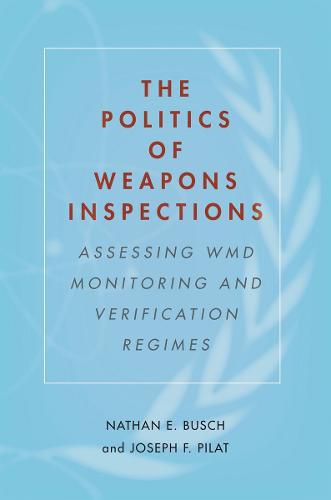Readings Newsletter
Become a Readings Member to make your shopping experience even easier.
Sign in or sign up for free!
You’re not far away from qualifying for FREE standard shipping within Australia
You’ve qualified for FREE standard shipping within Australia
The cart is loading…






Given recent controversies over suspected WMD programs in proliferating countries, there is an increasingly urgent need for effective monitoring and verification regimes-the international mechanisms, including on-site inspections, intended in part to clarify the status of WMD programs in suspected proliferators. Yet the strengths and limitations of these nonproliferation and arms control mechanisms remain unclear. How should these regimes best be implemented? What are the technological, political, and other limitations to these tools? What technologies and other innovations should be utilized to make these regimes most effective? How should recent developments, such as the 2015 Iran nuclear deal or Syria’s declared renunciation and actual use of its chemical weapons, influence their architecture?
The Politics of Weapons Inspections examines the successes, failures, and lessons that can be learned from WMD monitoring and verification regimes in order to help determine how best to maintain and strengthen these regimes in the future. In addition to examining these regimes’ technological, political, and legal contexts, Nathan E. Busch and Joseph F. Pilat reevaluate the track record of monitoring and verification in the historical cases of South Africa, Libya, and Iraq; assess the prospects of using these mechanisms in verifying arms control and disarmament; and apply the lessons learned from these cases to contemporary controversies over suspected or confirmed programs in North Korea, Iran, and Syria. Finally, they provide a forward-looking set of policy recommendations for the future.
$9.00 standard shipping within Australia
FREE standard shipping within Australia for orders over $100.00
Express & International shipping calculated at checkout
Given recent controversies over suspected WMD programs in proliferating countries, there is an increasingly urgent need for effective monitoring and verification regimes-the international mechanisms, including on-site inspections, intended in part to clarify the status of WMD programs in suspected proliferators. Yet the strengths and limitations of these nonproliferation and arms control mechanisms remain unclear. How should these regimes best be implemented? What are the technological, political, and other limitations to these tools? What technologies and other innovations should be utilized to make these regimes most effective? How should recent developments, such as the 2015 Iran nuclear deal or Syria’s declared renunciation and actual use of its chemical weapons, influence their architecture?
The Politics of Weapons Inspections examines the successes, failures, and lessons that can be learned from WMD monitoring and verification regimes in order to help determine how best to maintain and strengthen these regimes in the future. In addition to examining these regimes’ technological, political, and legal contexts, Nathan E. Busch and Joseph F. Pilat reevaluate the track record of monitoring and verification in the historical cases of South Africa, Libya, and Iraq; assess the prospects of using these mechanisms in verifying arms control and disarmament; and apply the lessons learned from these cases to contemporary controversies over suspected or confirmed programs in North Korea, Iran, and Syria. Finally, they provide a forward-looking set of policy recommendations for the future.